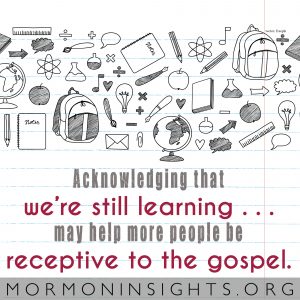A university professor tells what helps non-LDS students of Mormonism to gain a more accurate and nuanced understanding of the faith.
When Dr. Laurie F. Maffly-Kipp teaches her Mormon studies class at the University of North Carolina, she uses the study of Mormonism as a model that can be applied to the study of other religions. She helps her students see that when people have an informed understanding of a faith, their biases and false preconceptions tend to melt away.
In “What They Learned from the Mormons,” published in Mormon Studies Review, Maffly-Kipp, who is not a member of the LDS Church, discusses both barriers and bridges to becoming informed about the LDS faith. She shares three strategies that—although developed for teaching an introductory course on Mormonism to those not of the faith—may be helpful to us as we seek to promote a more accurate understanding of the Church within our own sphere of influence.
- “Use stereotypes; don’t ignore them.” Many of Maffly-Kipp’s students come into her class with negative stereotypes of Mormons. She suggests that instead of ignoring those notions, we should openly acknowledge them so they can be discussed and exorcised and real learning can begin.
- “Hearing internal disagreement among LDS Church members is crucial.” Many of Maffly-Kipp’s students enter class believing that Mormons do not think for themselves. She finds that her students are able to let go of this notion when they become exposed to difficult issues upon which Mormons disagree among themselves. “Students are willing to accept—or at least respect—a surprising variety of beliefs if they are convinced people are thinking for themselves. This is true even of some of the more controversial elements of the tradition.”
- “Focus on Mormonism as a living, breathing system with all the warts of any other human community.” Maffly-Kipp encourages students to expose themselves to as much of Mormonism as possible through interviewing members, attending worship services, and studying the religion. She finds that such exposure not only alters the way they think of Mormons but also often changes the way they view their own worship and spirituality.
Read Laurie F. Maffly-Kipp’s full article, “What They Learned from the Mormons.”
Access by subscription only. Click here for an annual digital pass ($10) to access the newest issues of all three Maxwell Institute periodicals.
Source: Mormon Studies Review, Neal A. Maxwell Institute for Religious Scholarship
—Marissa Compton, Mormon Insights
Photo courtesy of LDS Media Library



Excellent article! I particularly like #3.
Hi to every body, it’s my first visit of this website; this blog carries amazing
and in fact excellent stuff for visitors.
I thought #2 was really insightful. I think we always assume that we need to come off as completely united and always at least put out the image that we believe everything perfectly. It’s important to remember that Mormonism is more reasonable and approachable when others can see that it’s not always easy to live and believe.
I really like that you chose to highlight this particular article. It’s amazing that a non-LDS professor is doing a lot of good for the Church, helping her students to gain a better understanding of the religion beyond the stereotypes. I’m used to negative representations of us in the news media, so this article really made me feel good. And agreed, as members we need to promote the truth–that we do not know everything and will not know everything in this life. We walk by faith in God and his appointed leaders.
What a great article! I can see these same four ideas being applied to any religion someone doesn’t know about, not just to Mormonism. I think that Mormons also need to address our own stereotypes more. We tend to hide either behind them or completely reject them.